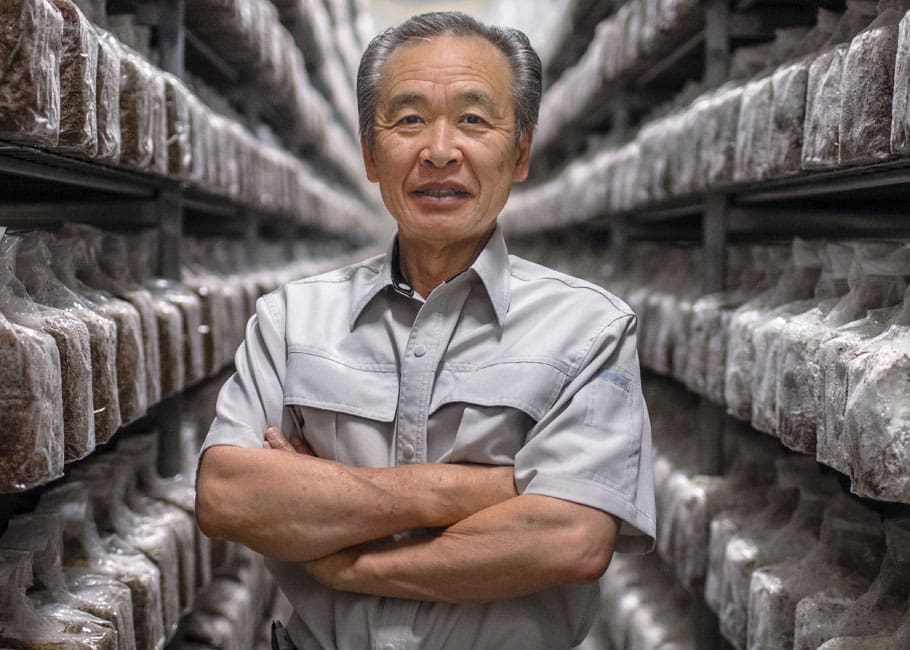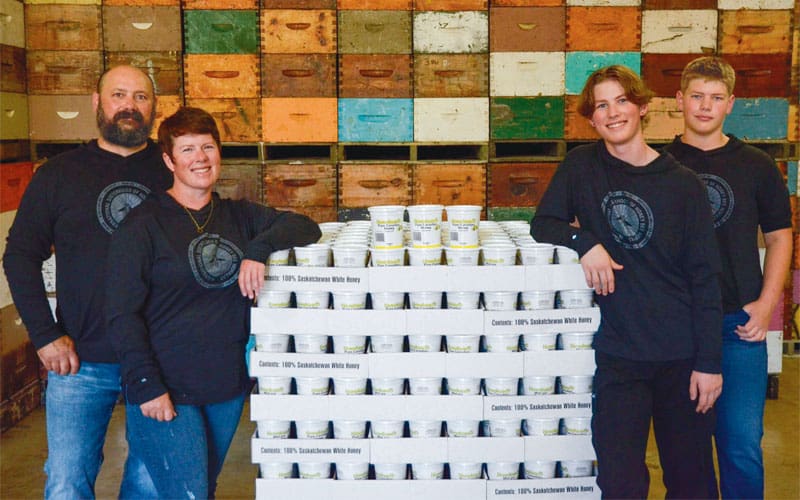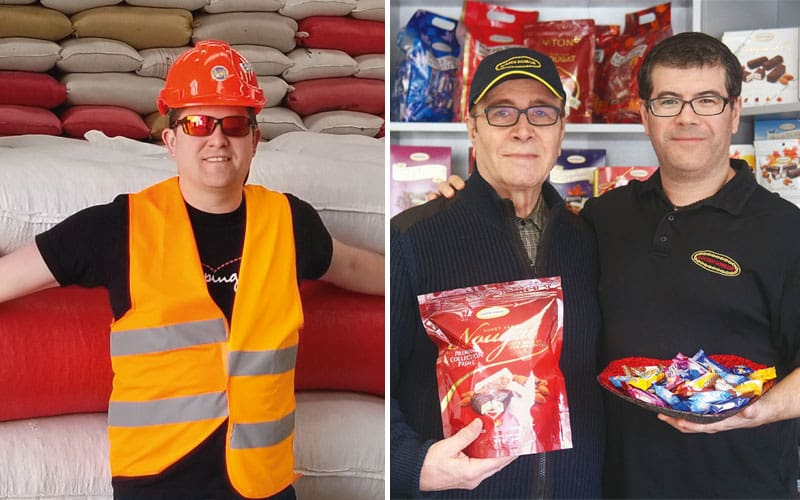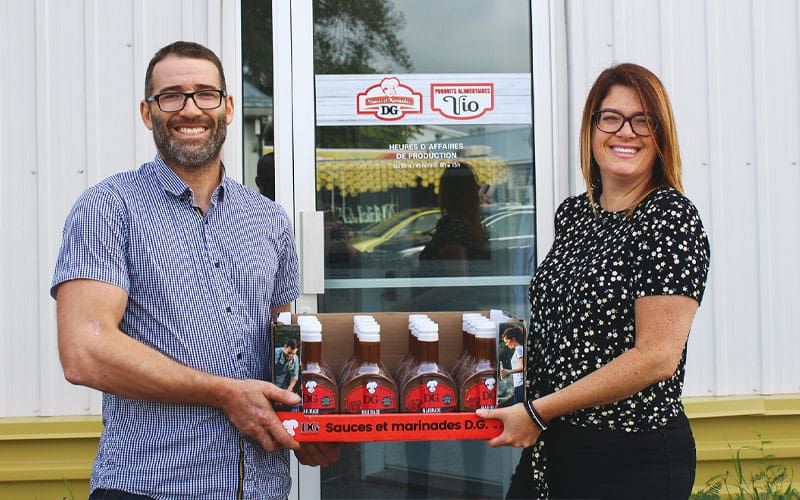
Mushroom purveyor Yoshinobu Odaira, founder of Shogun Maitake Canada
ERIC ROCKBURN/RED BUTTON PHOTOGRAPHY
Home grown
Costco warehouses are known for their selection of national brand-name products, but they also stock locally produced items that might be offered in only a few provinces or a handful of warehouses. These items help Costco buyers respond to local and regional tastes, and help set Costco apart from its competitors.
Locally sourced products not only cater to local tastes, they also help to create a feeling of hometown pride in warehouses across the country. Over the next few pages, we’ll introduce you to some of the small-scale regional suppliers whose goods add to your Costco warehouse’s “treasure hunt” feel—from candy to honey and mushrooms to coffee beans and more. —Stephanie E. Ponder
SHOGUN MAITAKE CANADA CO. LTD.
Location London, OntarioProducts Shogun Maitake Kuro Organic Mushrooms (Item 1595888)
Availability The Maritimes, Ontario, Quebec
Maitake means “dancing mushroom” in Japanese, because in ancient times those lucky enough to find these rare mushrooms—prized for their rich, intense taste, desirable texture and nutritional value—would celebrate with a dance, says Noriko Kurokawa, executive officer of Shogun Maitake Canada Co. Ltd. “These are highly sought after,” Kurokawa adds: 1 kilogram found in the wild can fetch up to $1,000.
It took Shogun Maitake founder, CEO and president Yoshinobu Odaira years of tireless experimentation to achieve consistent production of Kuro maitakes just like the wild ones found in the mountains of northeastern Japan. He founded his first business, Yukiguni, in 1983 to grow and develop new proteins for the Japanese market. His steady production of black maitakes led to the creation of a facility in Japan—where his business eventually claimed 70% of the market—and two years of cultivation research in Canada.
Odaira moved from Japan to Canada in hopes of bringing the mushrooms’ many health benefits to North America. Shogun Maitake Canada was formed in 2015. The London, Ontario–based company began supplying Costco organic black maitakes in November 2021. “This is [Odaira’s] passion,” Kurokawa says.
One maitake weighs an average of 600 grams (1.3 pounds), and each one takes 100 days from inoculation to harvest in a carefully controlled environment that mirrors a cycle of seasons. The company, made up of 18 employees, grows a total of 10,886 kilograms (12 tons) per month. Their mushrooms are cultivated free of pesticides and chemicals, using state-of-the-art technology to replicate natural conditions.
“We have to control temperature, humidity, ventilation and water,” Kurokawa says. “It’s a very sensitive and precise environment.”—Dan Jones

Danny Wasylenchuk and Sasha Howland with their sons, Ethan and Nate
© OLIVIA TOMCALA PHOTOGRAPHY
HOWLAND’S HONEY
Location Canora, SaskatchewanProducts Howland’s Honey 1 kg Creamed Honey (Item 181929)
Availability Saskatchewan
Saskatchewan is known for producing high-quality honey—and regional supplier Howland’s Honey is no exception.
“We have a really nice area for honey production here because there’s lots of hay land. It’s a beautiful honey pocket,” says Sasha Howland, who co-owns and operates Howland’s Honey alongside her husband, Danny Wasylenchuk. “The higher amount of clovers and alfalfa makes for a consistently light, mild-tasting honey.”
As the third generation of her family to operate the business, Howland has honey in her blood. Her grandfather Bob Howland started out as a hobbyist beekeeper in the Regina area and initially sold his honey door to door. In 1976, Sasha’s dad, Wink Howland, purchased some land about 1.6 kilometres south of Good Spirit Lake, where their operations are still based today. Wink officially trademarked the name in 1979 and then slowly grew the business from just a few hives to over 250. In later years, he also expanded into the retail market, including Costco, which placed its first order in 1996.
When Sasha joined the business in the early 2000s, they decided it was time to expand further. Today, Howland’s Honey has more than 1,000 hives and takes care of its own reproductive stock.
Although the company has decades of experience under its belt, Sasha says its priority has always been the same: to supply customers with a purely Saskatchewan product. “We are unique because we offer a single-source product,” she says. “Our honey is 100% Saskatchewan honey, and 100% from this farm.”—Naomi Hansen

Je LeDrew, of Jumping Bean Coffee; Riccardo Mazzucco and son Marco Mazzucco.
© JUMPING BEAN COFFEE INC.; COURTESY OF GOLDEN BONBON
JUMPING BEAN
Location Mount Pearl, NewfoundlandProducts East Coast Roast organic whole coffee beans (Item 252886)
Availability New Brunswick, Newfoundland, Nova Scotia
A quest for the perfect cup of coffee, a desire to help others and an engineering mind that never stops pushes Jumping Bean Coffee’s founder to produce some of the finest roasted coffee beans in Canada.
“We’re probably one of the most economical coffees. And you get all the values for that: great taste, fair-trade organic and low carbon footprint,” says Jeff LeDrew, owner of the Newfoundland-based coffee roaster and retailer.
A java connoisseur who looks at beans the way a winemaker looks at grapes, LeDrew started by turning his roasting hobby into a fundraiser for Rotary International. “I come from a small town in the middle of Newfoundland,” he says. “I love to give back and help people.”
In 2005, he opened his first café, in Paradise, Newfoundland. Today, Jumping Bean Coffee has eight locations and roasts about 227,000 kilograms (500,000 pounds) of coffee annually.
Just as important to LeDrew as roasting the perfect bean and helping the community is reducing Jumping Bean’s carbon footprint. He used his skills as an electrical engineer to develop the ECO2Roast™ system, and now produces 85% less carbon dioxide during the roasting process by using full heat recovery techniques.
Also unhappy about the plastic waste produced by single-serve coffee pods, LeDrew researched and found a pod made from plant-based materials and byproducts of the coffee roasting process. In fact, LeDrew delayed the release of the pods in order to find a more sustainable and fully compostable option.—Allison Lawlor
GOLDEN BONBON
Location New Westminster, British ColumbiaProducts Almond Nougat Bag (Item 669519); Almond Nougat Gift Box (Item 1668804)
Availability Alberta, British Columbia, Manitoba, Ontario
Ask Marco Mazzucco to compare the bland filler in commercial chocolate bars with the meringue-and-honey confection his grandfather Giuseppe began baking for customers in 1948 in Asti, Italy, and he’ll tell you the distinction is obvious.
Still, the CEO of Golden Bonbon replies with patience. Marco knows most North Americans have yet to learn that nougat—known as torrone in Italy—is a sought-after delicacy in Western Europe, or that the crunchy, nutty version originated around the 10th century in the Middle East.
“Honey is the centrepiece,” Mazzucco tells the Connection. “The softer version of nougat is light, fluffy and dessert-like—almost an extension of the marshmallow—with a nice aftertaste.”
Golden Bonbon maintains its standards in response to loyal customers: those who prefer their candy subtle and naturally sweet, made with fresh, locally sourced ingredients like clover honey, blueberries and cranberries, and Canadian maple syrup, along with air-roasted California almonds and premium cream and sea salt from France. Meringue-making follows the traditional family recipe; employees still process much of it by hand.
Mazzucco’s father, Riccardo, moved operations from Australia to western Canada in 1992, and the company built a relationship with Costco just a few years later. Costco targeted robust specialty markets and Golden Bonbon experimented from time to time with new products, always refusing to skimp on quality.
“We just stick to what we do; what we put inside the package stays the same,” Mazzucco says. “There’s a lot to be said for simplicity.”—Dana Tye Rally

Patrick Fortier and Shirley Tremblay
© STRATA GESTION STRATÉGIQUE
SAUCES ET MARINADES D.G.
Location Alma, QuebecProducts Twin packs of 750-mL bottles of DG Meat Marinade (Item 1654351)
Availability Quebec
The vast selection of bottled marinades on the market doesn’t faze Patrick Fortier, a dairy farmer and honey producer who owns Sauces et Marinades D.G. “Ours are the best, no question,” he says.
Housed on the Fortier family farm, along with a sister food company (salad dressing maker Vio), 200 dairy cattle, hundreds of beehives and a bee museum, D.G. produces a dozen marinades for meat and fish, as well as sauces for everything from vegetables and seafood to fondues and raclettes.
According to Fortier, who runs his farm and businesses with his wife, Shirley Tremblay, and the couple’s four children, all of D.G.’s products generate positive feedback from consumers on social media and anecdotally from family and friends.
But, he says, one product—DG Meat, a marinade designed to tenderize and add flavour to all kinds of meat before cooking—is a cut above the rest when it comes to both sales and customer satisfaction.
“People simply rave about it,” Fortier says about his top-selling marinade. “They say that once you soak meat in it for eight to 12 hours before cooking, you’ll never try anything else. Some people have even told me their kids learned to enjoy eating meat thanks to our marinade.”—Mark Cardwell

Kelvin Vanderveen with his sons, Jordan and Kenton
VANDERVEEN’S GREENHOUSES
VANDERVEEN’S GREENHOUSES
Location Carman, ManitobaProducts Christmas poinsettias, bedding plants, hanging baskets
Availability Manitoba
The Vanderveen family has been adding beauty and colour to Christmas celebrations and backyard gardens for almost 50 years. As owners and operators of Vanderveen’s Greenhouses, they supply poinsettias and a variety of bedding plants and hanging baskets to Costco warehouses in Manitoba.
“My father and mother, Jack and Louwina Vanderveen, started the greenhouses in 1975,” explains Kelvin Vanderveen. “They lived in a small farming community with most people having either grain or livestock farms. They were not interested in that, but the fl ower industry piqued their interest and they had the land and water supply to go into this.”
With the support and encouragement of the industry, Jack and Louwina enjoyed early success and gradually expanded their business. It is now owned by Kelvin and his sons, Kenton and Jordan, and encompasses 25 acres of greenhouses that produce flowers and plants year-round.
Vanderveen’s Greenhouses became a Costco regional supplier about 20 years ago. “We have had a great relationship with Costco,” Kelvin says. “The floral teams have always been easy to communicate with and very open to dialogue before, during and after shipping, and the receiving staff are very friendly and care about the products.
“We have built a good rapport with everyone involved,” he adds. Considering the mutual respect that Vanderveen’s Greenhouses and Costco have for one another, there is no doubt that their relationship will continue to blossom.—Sharon Chisvin

